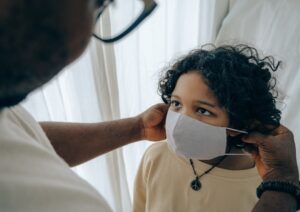Context Health care
Health care in Slovenia
Refugees and beneficiaries of subsidiary protection are entitled to participate in the health insurance in the framework of the national health care system.

Overview
Health care in Slovenia is organised primarily through the Health Insurance Institute of Slovenia (Slovene: Zavod za zdravstveno zavarovanje Slovenije) which is legally mandated to provide compulsory health insurance to all Slovenian citizens and non-citizens with permanent residence and their dependants. This public health care model is financed through a mandatory insurance program with contributions paid by both employers and employees. Not all costs are borne by the mandatory insurance scheme (with the exception of children’s health care), thus voluntary insurance fees for additional coverage are paid to either of the three private insurance companies by the majority of citizens and long-term residents. Those holding a temporary residence permit can participate in the public health care system if they are employed in Slovenia or are insured as a family member of a person employed by a Slovenian employer.
Groups that are not covered by the statutory system have access to emergency healthcare services only, while costs of other non-urgent medical care must be covered by the patient. Asylum seekers and migrants in an irregular situation do not participate in the national health care insurance. Asylum seekers are entitled to emergency medical and dental aid, emergency treatment and emergency rescue transportation. Before lodging an asylum claim, they undergo an entry medical preventative exam and registration. Being unable to choose a personal physician, asylum seekers face challenges in accessing medical services and their continuity of care can be hindred as a result of being treated by different on-duty medical professionals at various visits. Migrants in an irregular situation face the greatest legal and administrative barriers to accessing health care services. Several probono clinics provide basic healthcare services to persons with no healthcare coverage (both nationals – especially those who are homeless –, and migrants) who can only access treatment within emergency units in cases of immediate threat. Both migrants in an irregular situation and asylum seekers avail of the services of these clinics.
Vulnerable asylum seekers can request an expanded scope of medical services, including psychological support, subjected to a decision of a special commission. Asylum seeking women also have the right to contraception, reproductive health care, and termination of pregnancy. Children and adolescents aged up to 18 years and students below the age of 26 who are enrolled in a regular school program (on primary, secondary or tertiary level) have a right to health care services in the same extent as citizens of the Republic of Slovenia.
Refugees and beneficiaries of subsidiary protection are entitled to the health coverage in the framework of the national health care system. In accessing health services, the language barrier has been recognized as a key challenge. Medical professionals commonly express concern over treating patients with whom communication is hampered. In some locations, NGOs providing orientation and integration programmes for beneficiaries of international protection provide interpretation and translation services for certain languages. The language barrier also affects access to suitable and understandable information about local public health programmes or institutions and services. Publicly financed interpreters or cultural mediators who accompany migrants on visits to medical facilities help overcome linguistic and cultural barriers that may arise in accessing health care, however their services are at the time being limited to certain locations and programmes only.
Covid-19
The Covid-19 pandemic has increased health vulnerabilities of migrants. It has negatively impacted their access to medical care similarly as has been the case for the general population, however the migrant population experienced several additional barriers. Many migrants’ housing conditions do not allow for the observance of physical (social) distancing and the implementation of the recommended hygiene and preventive measures, including quarantine, poses a challenge. As a result of restrictive lockdown measures, migrants experienced job losses and increased economic precarity, which was linked to their ability to cover the costs for basic needs, including medical services. The vulnerability of migrants without a health insurance has been exacerbated. The medical assistance that was provided, such as through the work of the pro bono clinic, was reduced. For non-urgent cases, medical assistance was mostly provided over the telephone and via email.
The pandemic has increased uncertainties, anxiety and isolation and had a deteriorating effect on psychological health. The National Institute of Public Health (NIPH; Slovene: Nacionalni inštitut za javno zdravje) provided guidance for psychosocial support, however the health care system was overburdened, and this resulted in the reduction of psychosocial support available to migrants.
Basic access to information about Covid-19 was provided with the dissemination of translated information materials through NGOs and other relevant stakeholders in contact with migrants. Several NGOs and humanitarian organizations in Slovenia provided other type of assistance to migrants and refugees in need. Additionally, the NIPH issued guidance to medical staff on Covid-19 precautionary measures for vulnerable patients, including those with mental health issues that may arise and/or increase due to quarantine, self-isolation, and other Covid-19 related consequences.
In summer 2021, asylum seekers were able to access Covid-19 vaccination through a mobile vaccination unit.
Do you want to share your project with our community and stakeholders?
Context Health care
Health care in Romania
Overview The legal act governing the Romanian health system is the Law […]
Overview The legal act governing the Romanian health system is the Law […]
Context Health care
Health care in the Netherlands
Overview In 2006, the Health Insurance Act applied the rule that all residents […]
Overview In 2006, the Health Insurance Act applied the rule that all residents […]

